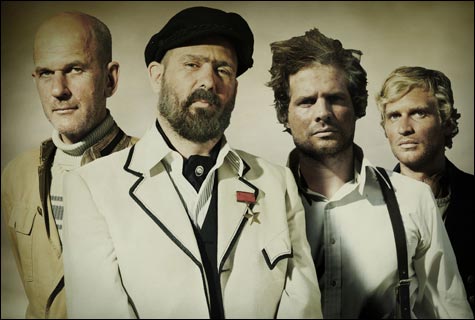
MARK EITZEL (second from left): “The whole happy/sad thing — the journalists make that up and people believe it.” |
Since the late ’80s, Mark Eitzel has written some of America’s most bitter and plaintive pop songs. Since the late ’80s, Ad Frank has produced some of Boston’s most bitter and plaintive pop songs. Their bands, American Music Club and Ad Frank and the Fast Easy Women, share a bill next Tuesday at Harpers Ferry. We thought it would be fun to put pop music’s most charming curmudgeons on the phone, so Ad gave Mark a call and talked to him about AMC’s most recent CD, The Golden Age (Merge), AMC guitarist Vudi, and what it’s like to front a band, write songs, and grow old . . . On second thought, maybe “fun” isn’t the right word . . .
I'm in my 40s, so if these questions sound like Im obsessed with age and career longevity it’s because I am. It’s my problem, not yours.
Okay.
I can’t tell if the tone on The Golden Age is hope or resignation. It sounds like life is still pretty tough, but maybe more bearable, less desperate. Do you think the tone of your songwriting has changed?
That might be who I am, but I’m not sure that’s what the songwriting is necessarily. I don’t really plot what voice it is people assume I’m using.
Do you feel more hopeful or resigned than you did 15 years ago?
I’m less melodramatic. I’m less histrionic. I don’t particularly care about drama. I think that’s what the album is, in terms of songwriting. But also, the way it was recorded was just four guys in a rehearsal space. Rehearse the music and record what you rehearsed, as opposed to “We’re making the most important record of the decade.” It’s a lot more casual than the AMC records that we’ve made in the past.
Do you write differently now that you’re with the band again?
Having a band basically means two things. First, I’m playing with three really intelligent people who put up with me, so I’ve got to step it up a little bit. Two, we split the cut of everything pretty evenly, so I don’t have to have salaries. So we’re able to develop the music a little better and make it more our own.
So the songs change when you bring them to the band?
Always. Whenever you bring a song to a band and they just can’t play it, they can’t arrange it, it doesn’t sound right, usually the problem is with the song.
I’m not going to print that answer. I don’t want my band to read it.
Exactly.
It’s going to be kind of weird to see you playing without Danny [Pearson] and Tim [Mooney]. Is it weird for you at all?
No, it isn’t, strangely enough. We wanted to start doing the record, and I could see it starting the same way Love Songs for Patriots went down — which was, we record all the songs without Vudi, and Vudi would come up to San Francisco from LA for a weekend and would lay down 50 tracks during the night and I’d ProTools the parts to death. I wanted Vudi to be in the middle of the music. He’s important. Vudi can stand on the stage and play nothing and it feels better. I finally called him and said, “Hey, I’m coming down. Let’s just play together and see what happens.” Suddenly, playing with Vudi, there’s hope. It’s such a fucking pleasure.